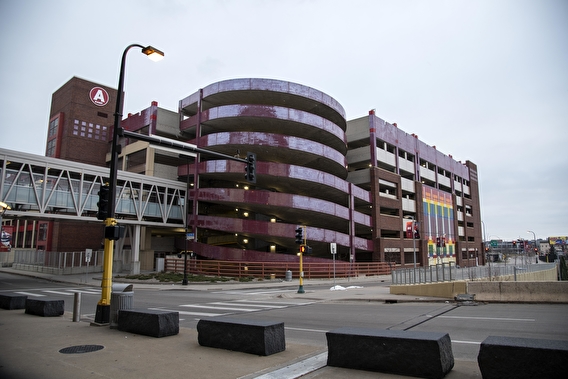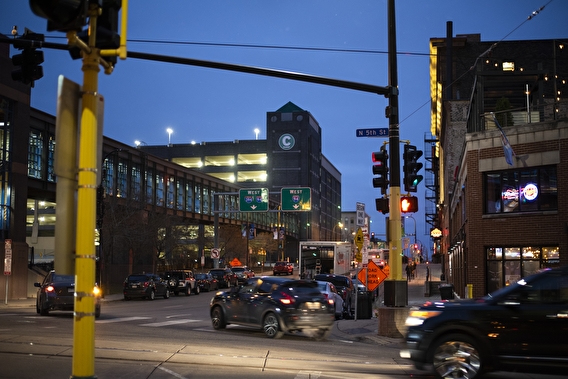
Transportation is the largest source of greenhouse gas emissions in both the US and the Twin Cities, and commuting trips are a major contributor to these emissions. To meet its emission-reduction mandates, Minnesota needs strategies to reduce auto trips—especially driver-only trips without passengers.
A recent U of M project aimed to leverage existing transportation infrastructure and systems to provide more flexible, multimodal transportation options for parking contract holders at Minneapolis’ ABC Ramps—thereby reducing the number of solo trips.
“Of the many strategies to reduce car trips, encouraging multimodal integration is a promising direction, as a single transportation mode is unlikely to fulfill the mobility needs of various commuters,” says Yingling Fan, a professor with the Humphrey School of Public Affairs. “Our goal for this project was developing and implementing a flexible commute program that incentivizes commuters to drive less—an answer to the ubiquitous monthly parking contract model that provides little incentive for commuters to avoid driving from one day to the next.”
ABC Ramps is a 6,000-stall garage complex in downtown Minneapolis owned by the Minnesota Department of Transportation (MnDOT). Most users tend to drive alone.
The research team began by working with a group of Twin Cities transportation planning practitioners to design and implement a hybrid parking–transit product for ABC Ramp users; the group included Elliott McFadden, manager for MnDOT’s state shared mobility, and Nicole Campbell, MnDOT’s lead for the ABC Ramps.
The resulting program—known as FlexPass—offered unlimited transit use along with in-and-out privileges at the ramps for 10 or 14 days per month, depending on the chosen contract. The cost of FlexPass was calculated to offer a discount over simply combining existing transit and parking products, thereby rewarding commuters for embracing limitations and mode flexibility.
Next, the study team collected data to assess the viability of this alternative parking contract design. These efforts included online interest surveys, online evaluation surveys, and travel behavior data collection using the Daynamica app. The research was conducted in two phases, beginning in February 2020 and ending in August 2022.
During the project’s second phase (beginning in October 2021), FlexPass was adjusted to offer two options—a parking-only 14-day flexible pass and one that offered parking plus unlimited transit access—in response to a survey of interested FlexPass users collected during summer 2021.

The implementation of the FlexPass program, however, was severely impacted by the COVID-19 pandemic, which drastically altered commute patterns in Minneapolis. For example, in fall 2021, ABC Ramps were filled at only 20 to 30 percent of their daily capacity, and in December 2021, ridership on Metro Transit was half of pre-pandemic levels.
“We set out to investigate the ability of commuter programs to shape commuting behavior and test the viability of a combined parking and transit program. Little did we know the study would be conducted during COVID, causing a large shift in metro-wide commuting habits,” Fan says.
Despite the challenges of COVID, researchers found that integrated parking and transit passes designed to limit the number of single-occupancy vehicle (SOV) driving trips are a potentially viable option that could offer downtown commuters flexibility and an incentive to telecommute or take transit to work more often—promoting more sustainable mobility.
Moving forward, MnDOT will continue to offer the FlexPass option at the A Ramp with an eye toward making FlexPass a permanent product for ramp users. Future opportunities for advancing this project include better integrating parking with transit, offering FlexPass in more of downtown Minneapolis, and simplifying commuter tax benefits.
“While we were unable to develop definitive findings on the impact FlexPass had on reducing SOV trips, it was extremely popular among its users and gives employers a more flexible, affordable option to offer their hybrid telework staff,” McFadden says.
The project was sponsored by MnDOT and the Metropolitan Council.
Writer: Megan Tsai


